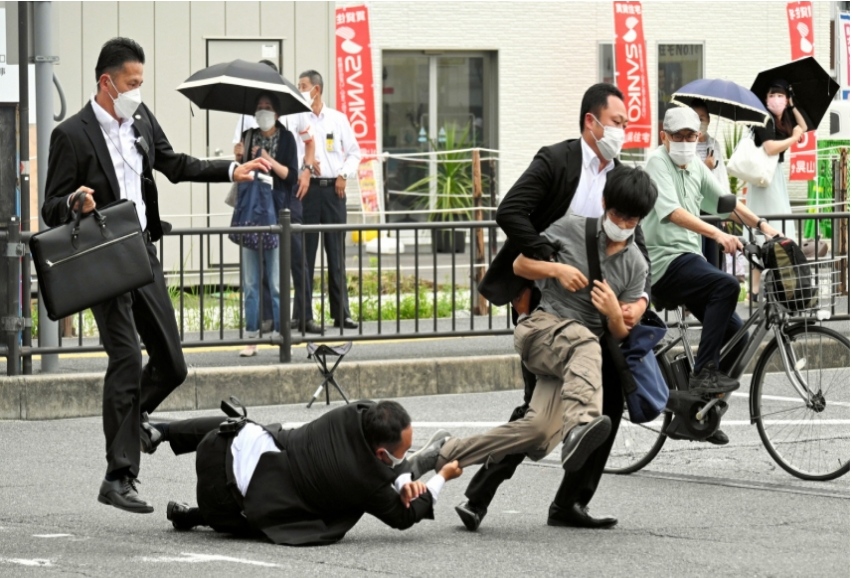Japanese Ex PM Shinzo Abe killed by gunshot

Security personnel tackle a suspect believed to have shot former prime minister Shinzo Abe on July 8, 2022 in Nara, Japan.
Former Japanese prime minister Shinzo Abe, 67, died hours after being shot by a gunman on Friday in western Japan’s Nara, where he was making a campaign speech for the parliament’s upper house election to be held on Sunday. Analysts described Abe’s assassination as the biggest political incident in Japanese politics since the end of World War Two.
Abe’s passing was confirmed by Japanese state broadcaster NHK around 5 pm on Friday afternoon, hours after Abe was shot from the back and collapsed during his street speech, with blood on his shirt.
Before the final announcement of Abe’s death, Japanese media said Abe was apparently bleeding and in a state of cardiopulmonary arrest. The Kyodo News previously said Abe was rushed to a nearby hospital but showed no vital signs.
The attacker has been arrested and the case is under investigation by the local police. According to Japanese media reports, the suspect is a 41-year-old man and the motive for the attack remains unclear.
After the shooting, Japanese Prime Minister Fumio Kishida condemned it as barbaric earlier on Friday, saying he prayed for Abe’s survival.
At the ongoing G20 foreign ministers’ meeting, Russian Foreign Minister Sergey Lavrov expressed sympathy to Tokyo over the attack, Sputnik reported.
US Ambassador to Japan Rahm Emanuel said on Friday following the attack that the US is “saddened and shocked” by the shooting, describing Abe as an unwavering ally of the US.
As a two-time prime minister and leader of the largest faction in Japan’s ruling Liberal Democratic Party (LDP), the attack on Abe could ripple through Japanese politics and the international community, experts said. The Japanese right-wing forces may use this incident to push forward the trend of conservative transformation in Japanese politics, and Abe’s supporters will continue to promote “free and open Indo-Pacific” and his other policies, bringing more security risks to the geopolitics of Northeast Asia, according to analysts.
Not just by accident
Since the shooting comes at a sensitive time ahead of the upper house election, political motives could not be ruled out.
Although Abe has been the longest-serving prime minister in Japan, there are mixed opinions on Abe in Japan, and anti-Abe public opinions have always existed, including dissatisfaction with the widening gap between the rich and the poor caused by Abenomics, and disgust with his forced adjustment of military and security policies.
Such violence should be strongly condemned, but Japan should reflect on whether there is a danger of polarization in its domestic politics.
Although politics in Japan has been calm on the surface in recent years and the ruling status of the LDP is stable, populist and other extreme ideas are still surging against the background of a long-term economic downturn, experts said.
Japan is actually well-known for its good public security and strict control of firearms, but in recent years, there are still vicious public security incidents, which is also related to the stagnation of economic and social development in Japan and the suppression of social thoughts.
Japan is facing multiple problems such as the depreciation of the yen, inflation, unemployment and the rebound of the epidemic, which all require the Japanese government to take effective measures. Instead of responding to people’s anxiety and dissatisfaction, Japanese politicians are constantly hyping threats of neighboring countries, deflecting the attention of the public and stressing the need to strengthen the military.
As the leader of Japan’s largest political faction, Abe has long wielded a lot of influence in the country’s domestic and foreign affairs, Liu said, noting that Japan’s opposition is too loose to balance the LDP’s policies.
Therefore, it cannot be ruled out that the criminal suspect was strongly dissatisfied with the policies of the Japanese government under the “de facto control of Abe,” as there’s no way to change the status quo, so he picked an extreme way.
Stimulation to the right wing
Although the attacker’s political leanings have yet to be officially confirmed, it is almost certain that Abe’s death will not stop the conservative trend in Japanese politics as a whole, but may strengthen it to some extent.
Abe has served as Japanese prime minister twice, from 2006 to 2007 and from late 2012 to 2020, making him the longest-serving prime minister under Japan’s modern cabinet system. Abe has continued to play a major role in Japanese politics as a member of the House of Representatives since stepping down as prime minister in September 2020 due to health problems.
Abe’s visit to Nara is to promote the LDP’s constitutional revision program. Abe’s future successor could accelerate the constitutional revision process under the banner of “inheriting Abe’s legacy.”
The attack on Abe will certainly provoke the extreme Japanese right wing. Ahead of upper-house elections, Abe’s death could serve as a “symbol” for the LDP conservative forces to gain more sympathy from the Japanese public.
Japanese nationalism is also likely to be further strengthened by the incident. People may have concerns about whether the volume of calls in Japan to return to the path of war will increase further.
At the moment, Japan does not seem to have the potential to radically change the country’s trajectory or the regional dynamics, but Abe’s death could stimulate the extreme Japanese right wing to promote populist, xenophobic and even extreme political goals.
Similar to Japan’s domestic politics, Abe’s successors and supporters are expected to continue to promote Abe’s external policy in Indo-Pacific and active participation in the QUAD mechanism, and accelerate the pace of NATO’s entry in Asia, bringing more risks to the geopolitics of Northeast Asia.




